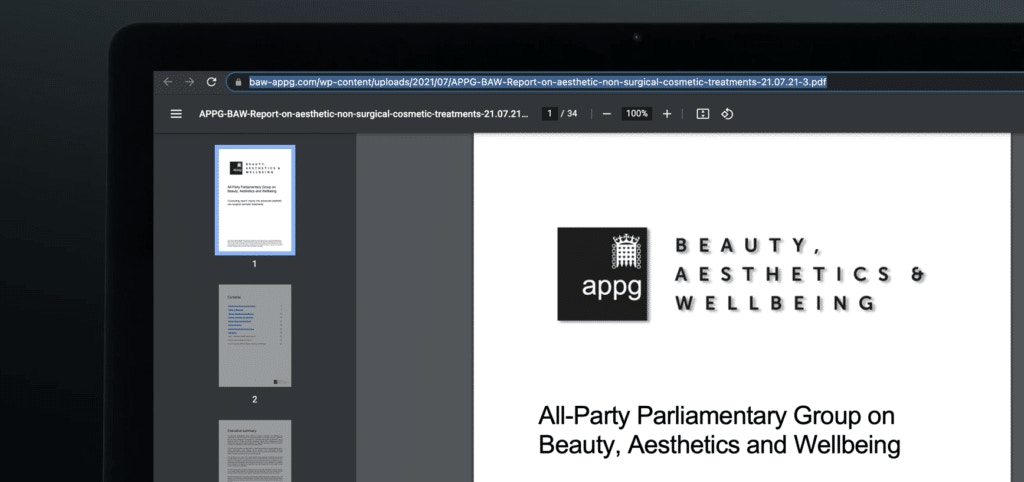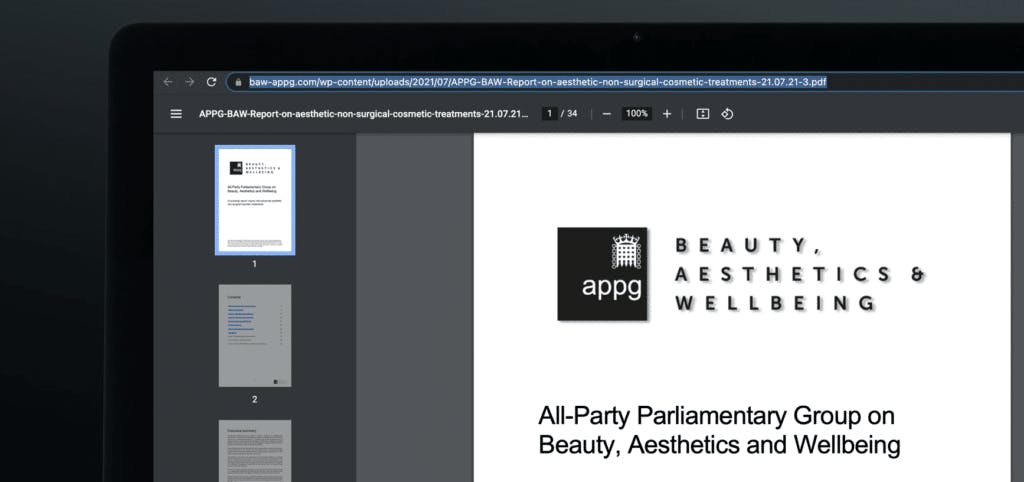APPG Inquiry Report Demands Aesthetics Education Standards

The results of the All-Party Parliamentary Group (APPG) on Beauty, Aesthetics and Wellbeing Inquiry into non-surgical cosmetic procedures have now been published. They call for a national registration scheme and higher aesthetics education standards by way of a minimum qualification which all aesthetics practitioners should obtain.

The full concluding report can be downloaded from the APPG website.
Below are the responses to this important news from leading aesthetics industry experts, Harley Academy founder and executive chairman, Dr Tristan Mehta and chair of the Joint Council of Cosmetic Practitioners, Professor David Sines, CBE.
We will be breaking down the full outcome of the inquiry in more detail, to help you understand the scale of its recommendations and ramifications for the aesthetic medicine industry in the UK, separately.
APPG Inquiry Findings: Aesthetics Industry Responses
Dr Tristan Mehta
Founder and executive chairman of Harley Academy, the largest aesthetic medicine training provider in the UK for licensed healthcare professionals. Harley Academy developed and pioneered the industry-leading Level 7 qualification.
“The recommendations from the year-long parliamentary group consensus are a significant step in ensuring public protection from dangerous complications associated with non-surgical cosmetic procedures such as blindness and permanent scarring.
“Since the Health Education England recommendations in 2013, the team at Harley Academy have pioneered higher standards in education and training for injectables throughout the UK – which is now a key outcome of the report.
“Through calling for fillers to become prescription-only and mandatory medical oversight for such treatments, the risk of permanent complications can be significantly reduced – the treatment for many complications with injectables need a medical prescriber.
“As an approved partner and Training & Education Committee member of the JCCP, we will be working to ensure that Harley Academy delivers on its mission to qualify medical injectors across the country to the requested standard – a Level 7 Diploma in Botox & Dermal Fillers.
“Some skeptics may see this as just another report and recommendation – but when will this become legislation? It is likely that regulation will be enforced by Environmental Health – the same way the tattoo industry is regulated – to ensure that all premises and practitioners meet these standards, over the coming years.
“Since the Health Education England report in 2013, aesthetics has become more mainstream, with consumers becoming significantly more conscious of treatments, the possible benefits and associated complications. It is a crucial time for the sector to come together and finally achieve much-needed regulation.”
Professor David Sines, CBE
Chair of the Joint Council of Cosmetic Practitioners (JCCP), an industry body which has consistently called for tougher regulations and higher standards in aesthetic medicine. The JCCP registers practitioners and training providers with the key remit of ensuring patient safety and public protection. In 2020 the organisation launched a new campaign to this end, called the 10 Point Plan.
“After a lengthy period of discussion with practitioners, consumers, patients, stakeholders and politicians we have concluded that in the interests of patient safety and public protection, high-risk and potentially harmful procedures, such as the insertion of dermal fillers or the injection of toxins should only be administered by appropriately trained healthcare professionals.
“I welcome the APPG report and I would urge the Health Minister, Nadine Dorries MP, to act on the recommendations as quickly as possible. It is clear, however, that the government needs to go further. It is increasingly apparent that at this time high-risk procedures, like the injection of toxins and the insertion of dermal fillers, should only be administered by healthcare professionals who have the necessary skills, qualifications and competence in these areas. In terms of the regulation of products, the JCCP welcomes the APPG’s recommendation that the regulation of dermal fillers must be brought into line with injectable toxins as a Prescription Only Device”.
All information correct at the time of publication.
Download our full prospectus
Browse all our injectables, dermal fillers and cosmetic dermatology courses in one document
By submitting this form, you agree to receive marketing about our products, events, promotions and exclusive content. Consent is not a condition of purchase, and no purchase is necessary. Message frequency varies. View our Privacy Policy and Terms & Conditions
Attend our FREE open evening
If you're not sure which course is right for you, let us help
Join us online or in-person at our free open evening to learn more
Our Partners














STAY INFORMED
Sign up to receive industry news, careers advice, special offers and information on Harley Academy courses and services

